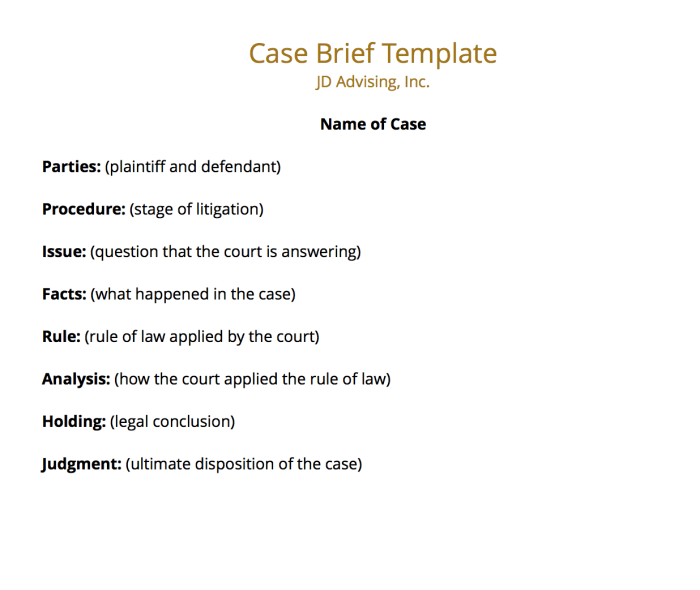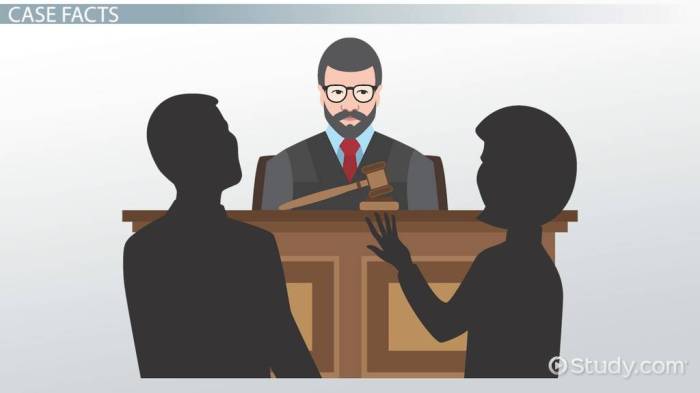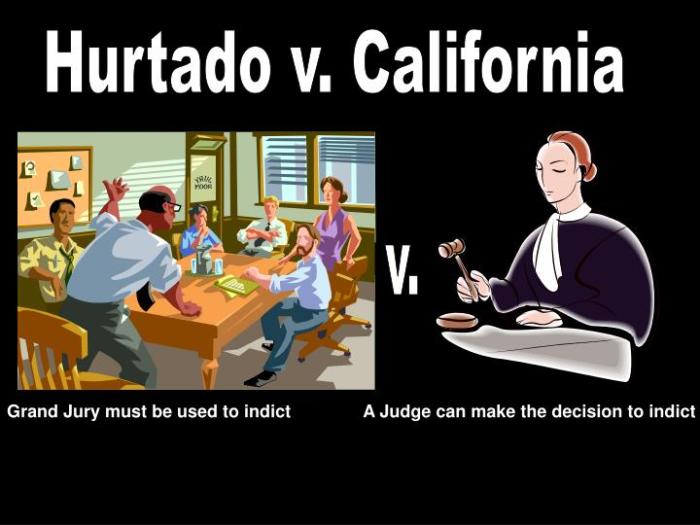The Hurtado v. California case brief provides an in-depth analysis of a seminal Supreme Court case that shaped the interpretation of the Due Process Clause of the Fourteenth Amendment. This case, decided in 1884, remains a significant precedent in constitutional law, influencing legal reasoning and debates to this day.
The case involved the conviction of Jose Hurtado for murder in a California state court. Hurtado argued that his trial violated the Due Process Clause because the state court did not provide him with a grand jury indictment. The Supreme Court, in a controversial decision, ruled against Hurtado, holding that the Due Process Clause did not incorporate the Fifth Amendment’s requirement for a grand jury indictment.
Case Overview: Hurtado V. California Case Brief

The case of Hurtado v. California (1884) was a landmark Supreme Court decision that ruled that the Due Process Clause of the Fourteenth Amendment did not incorporate the specific protections of the Bill of Rights, including the right to a grand jury indictment, against the states.
This meant that states were not required to provide the same level of due process protections as the federal government.
Background
The case arose from the conviction of Jose Hurtado for murder in California. Hurtado was charged with murder but was not indicted by a grand jury. Instead, he was charged by information, a less formal method of accusation. Hurtado argued that his conviction violated his due process rights under the Fourteenth Amendment, which provides that no state shall “deprive any person of life, liberty, or property, without due process of law.”
Specifically, he argued that he had a right to be indicted by a grand jury, as guaranteed by the Fifth Amendment.
Legal Reasoning

The Supreme Court’s decision in Hurtado v. Californiarested on its interpretation of the Due Process Clause of the Fourteenth Amendment. The Court held that the Due Process Clause does not incorporate all of the specific protections of the Bill of Rights, but only those that are “fundamental” to a fair trial.
The Court’s interpretation of “fundamental fairness” was based on the common law tradition. The Court reasoned that the Due Process Clause was intended to protect those rights that were essential to a fair trial under the common law. These rights included the right to a jury trial, the right to confront witnesses, and the right to counsel.
Application to Hurtado
In Hurtado, the defendant was charged with murder. He was convicted by a judge without a jury. The Supreme Court held that this did not violate the Due Process Clause because the right to a jury trial was not a “fundamental” right.
The Court reasoned that the common law did not guarantee the right to a jury trial in all cases, and that the states were therefore free to dispense with juries in non-capital cases.
Dissenting Opinions

The dissenting justices in Hurtado v. Californiaargued that the Due Process Clause of the Fourteenth Amendment incorporated the specific protections of the Bill of Rights against the states. They contended that the Fourteenth Amendment was intended to protect the fundamental rights of all Americans, regardless of where they lived, and that these rights included the right to a grand jury indictment, the right to confront witnesses, and the right to a unanimous jury verdict.
Arguments of the Dissenting Justices
The dissenting justices argued that the text of the Fourteenth Amendment, which states that no state shall “deprive any person of life, liberty, or property, without due process of law,” clearly incorporates the protections of the Bill of Rights. They pointed out that the Due Process Clause had been interpreted to incorporate the Bill of Rights in previous cases, such as Barron v. Baltimore(1833). They also argued that the purpose of the Fourteenth Amendment was to protect the rights of all Americans, including those who lived in states that had not yet adopted the Bill of Rights.
Impact of the Dissenting Opinions
The dissenting opinions in Hurtado v. Californiahad a significant impact on the legal analysis of the case. The majority opinion relied heavily on the argument that the Due Process Clause did not incorporate the Bill of Rights, and the dissenting opinions provided a strong counterargument to this position.
The dissenting opinions also helped to lay the groundwork for future Supreme Court decisions that would incorporate the Bill of Rights against the states.
Historical Significance

Hurtado v. California holds immense historical significance as a pivotal case that shaped the development of constitutional law in the United States. It has had a profound impact on the interpretation of the Due Process Clause of the Fourteenth Amendment and continues to influence contemporary legal debates.
Landmark Ruling on Due Process, Hurtado v. california case brief
The Supreme Court’s ruling in Hurtado established a fundamental distinction between the protections guaranteed by the Bill of Rights and those applicable to the states under the Fourteenth Amendment. The Court held that the Due Process Clause did not incorporate all of the provisions of the Bill of Rights, leaving it to the states to determine the specific procedures and protections necessary to ensure fairness in criminal proceedings.
Influence on Constitutional Interpretation
Hurtado’s legacy lies in its impact on the interpretation of the Fourteenth Amendment. The Court’s narrow interpretation of the Due Process Clause has been cited in subsequent cases to justify the exclusion of certain rights from the protections afforded by the amendment.
This has had a significant impact on the scope of federal judicial review of state criminal proceedings.
Relevance to Contemporary Legal Issues
The principles established in Hurtado continue to resonate in contemporary legal debates. The case is often cited in discussions about the balance between individual rights and state authority, the limits of federal judicial power, and the evolution of constitutional law.
Top FAQs
What was the main issue in Hurtado v. California?
The main issue was whether the Due Process Clause of the Fourteenth Amendment incorporated the Fifth Amendment’s requirement for a grand jury indictment.
How did the Supreme Court rule in Hurtado v. California?
The Supreme Court ruled that the Due Process Clause did not incorporate the Fifth Amendment’s requirement for a grand jury indictment.
What is the significance of the Hurtado v. California case?
The Hurtado case established the principle that the Due Process Clause does not automatically incorporate all the provisions of the Bill of Rights.